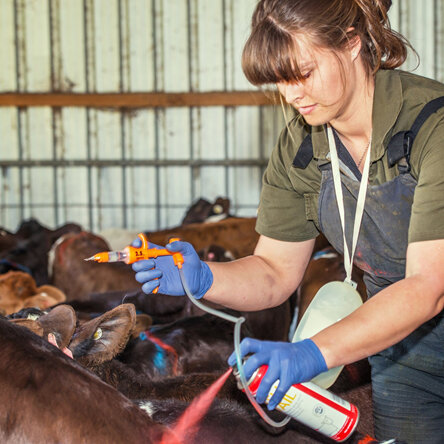Franklin Vets
Franklin Vets - excellence in veterinary care for dairy, farming, lifestyle, equine and household pets. BESTPRACTICE ACCREDITED NZ.
Your account is powered by Storbie. To edit your profile visit my.storbie.com
Your account is powered by Storbie. To edit your profile visit my.storbie.com

Clostridial vaccines protect calves against diseases caused by bacteria such as tetanus, blackleg, and botulism. These vaccines work by stimulating the calf's immune system to produce antibodies against the bacteria. Clostridial diseases are usually fatal, and vaccination is the most effective way to prevent them. Calves can be vaccinated as early as two weeks of age, and boosters are required annually. We recommend using Ultravac 6 in 1 or Covexin 10 for adequate cover.
BVDV is a viral disease that can cause reproductive problems, respiratory disease, and reduced growth rates in calves. Vaccination against BVDV can reduce the incidence and severity of disease. It is recommended to vaccinate calves before they are six months old, as BVDV can cause long-term damage to the immune system. Bovilis BVD provides foetal protection as long as the vaccination is given 4 weeks before mating.
Leptospirosis is a bacterial disease that can cause abortion, stillbirth, and reduced milk production in cows. Calves can also become infected with leptospirosis, resulting in fever, jaundice, and kidney damage. Vaccination against leptospirosis can protect both cows and calves from the disease, as well as protecting yourself. Calves should be vaccinated at around three months of age and require annual boosters. We recommend using Lepto 3 Way as this covers the strain of leptospirosis passed on by rodents.
IBR is a viral disease that can cause respiratory disease, abortion, and reduced milk production in cows. Calves can also become infected with IBR, resulting in fever, nasal discharge, and coughing. Vaccination against IBR can reduce the incidence and severity of disease. Calves can be vaccinated as early as four months of age, with a booster required annually. Hiprabovis provides protection for both IBR and BVD in a single vaccination.
Salmonella is a bacterial disease that can cause diarrhoea, fever, and dehydration in calves. Disease in adult stock is significant with outbreaks potentially causing severe losses. Vaccination against salmonella can reduce the incidence and severity of disease. Calves should be vaccinated from three months of age, with a booster required annually.
Vaccination is an important part of calf management on a dairy farm. It is essential to consult with your veterinarian to develop a vaccination program that is specific to your herd's needs. A well-planned vaccination program can reduce the incidence and severity of infectious diseases in your herd, resulting in healthier calves, reduced vet bills, and increased productivity.
Dr Leah Wakeford BVSc (Dist) - Branch Manager & Farm Vet at Waihi Vets
Franklin Vets - excellence in veterinary care for dairy, farming, lifestyle, equine and household pets. BESTPRACTICE ACCREDITED NZ.



